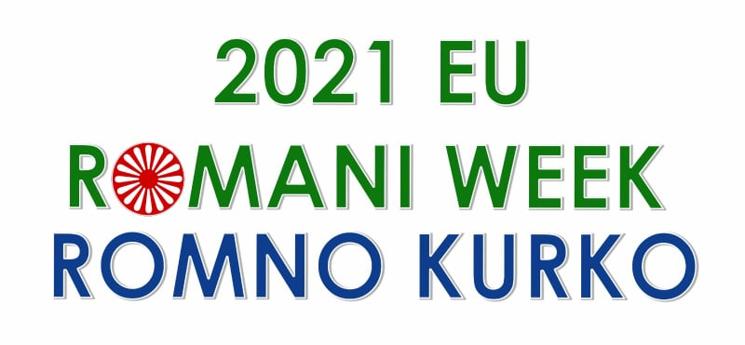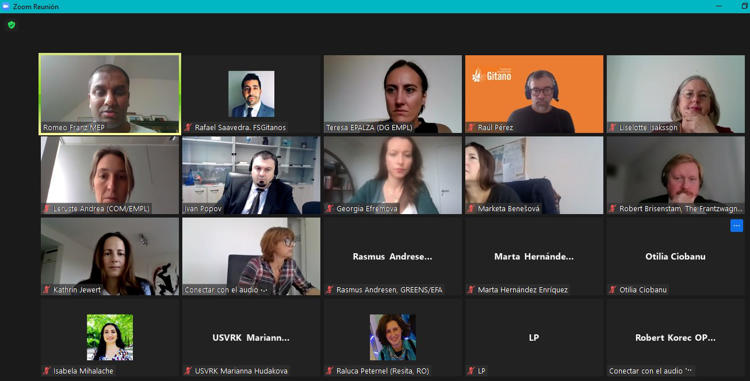24/09/2021
FSG Internacional

Sponsored by members of the European Parliament and with the partnerships of diverse Civil Society Organisations, the Romani Week 2021 was held online
This year the Romani Week was held from 27 to 30 September. Since its first edition in 2016, Romani Week has offered an interesting space for debate between politicians, representatives of the main European Institutions such as the European Parliament, the European Commission, the Council of Europe or the Fundamental Rights Agency, together with the participation of numerous Civil Society Organizations from all Europe.
The main objective of the Romani Week, from civil society perspective, is bringing the situation of the Roma People within the European political agenda and that the 12 million European Roma citizens have ensure their access to full citizenship. The Romani Week aims also to play a relevant role facilitating knowledge exchange and capacity building between Romani people, civil society, policymakers and officials; advocating for specific thematic areas (health, education, employment, entrepreneurship, environmental justice, anti-racism); recognition of antigypsyism; debate of Post 2020 EU Policies for Romani people.
This edition was held online and a little later than usual, since it is usually framed around April 8th, the International Roma Day.

Are the online platforms safe for Roma? – Addressing online hate speech against Romani communities
Online Hate speech has been steadily on the rise during the past decade, especially during the on-going Covid-19 pandemic. Making it appearance known at the highest level of the public administration of some Member States, where transformation into policy is just one step away.
Hate speech as a manifestation of antigypsyism needs particular attention because of its multiplier effect: it influences public opinion, fuels tension, and paves the way for discrimination and hate crimes. Online media plays a particular role in spreading and inciting hate speech. It strengthens stereotypes, uses offensive language, denies, or trivializes antigypsyism. Through social media hate speech reaches millions of people and allows perpetrators to anonymously incite hatred and violence.
The event aims to foster a debate which would lead to identifying positive solutions, policy proposals, as well as advocacy points relevant for further addressing the new challenges arisen during the current pandemic that present new obstacles for a better inclusion of Roma in society.
From Fundación Secretariado Gitano, we had the opportunity to share our experience in the increase of hate crimes on social networks during the Covid19 pandemic, the effects and impact caused by this type of action in the victims. All this is addressed in our recent study “The Covid 19 crisis and Anti-Roma hate speech. An analysis on through case studies of its origins, dissemination and impact upon people”. It is a qualitative analysis of six episodes about anti-Roma hate speech that emerged as a result of the pandemic, many of them reported by the FSG to the Hate Crimes Prosecutor's Office.
Making EU funding & finance work for Roma
Since the outbreak of the COVID-19 pandemic, the EU has worked relentlessly to protect the health and wellbeing of those living in the EU and beyond and to repair the economic and social damage brought about by COVID-19.
Cohesion Policy funds, together with the Recovery and Resilience Facility, the Instrument for Pre-Accession Assistance (IPA) and the InvestEU, will be key in providing large-scale financial support to address the needs of people who have been disproportionally hit by the pandemic, including the Roma.
The workshop had the double objective of:
Fundación Secretariado Gitano presented, together with Fundación Accenture, the project Empleando Digital an example of fruitful alliance between the third sector and the economic sector, to create better opportunities to vulnerable people in the technological employment and to improve their digital skills. This project, developed in collaboration with the Spanish Red Cross and cofounded by Fundación Accenture and the Spanish European Social Fund, won the 2019 Vocational Education and Training Excellence Awards.
Related documents
Links